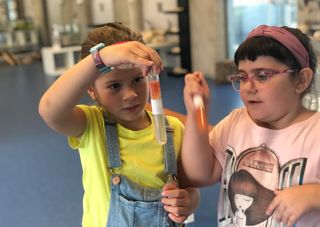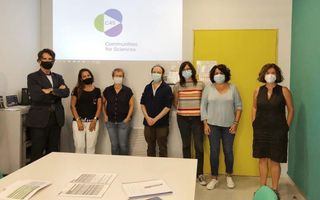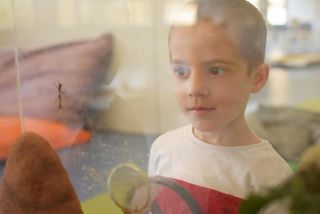- The European project H2020 Communities for Science (C4S) will work for three years in a partnership made up of eleven institutions from eight European countries
- It includes pilot experiences in different countries involving groups of children and young people at risk of vulnerability
The European project «Communities for Sciences – Towards promoting an inclusive approach in science education» (C4S), led by the UVic-UCC Manresa campus, was launched on 1 October 2020, and aims to work towards making science education more inclusive in an international context. It is part of the Horizon 2020 programme, and has a financial endowment of €1.1 million. This is the first European project to involve both the UVic-UCC campuses. The project is led by the Bages University Foundation, and in addition to the UVic-UCC Vic campus, the participants are the IB-Hochschule Berlin (Germany); Galileo Progetti (Hungary); Universita’Degli Studi Di Milano-Biccocca (Italy); Bildungsdirection Fuer Wien (Austria); Comune di Sesto Sant Giovanni (Italy); Erasmushogeschool Brussel (Belgium); Wirtschaftsuniversitat Wien (Austria); Lunds Universitet (Sweden) and New Bulgarian University (Bulgaria).
Gabriel Lemkow, the principal investigator of the C4S project, explains that the project is located at the intersection between inclusion, education and science - three areas of action and reflection that "are often considered in detail, but as separate concepts. We are going to try to bring them together in this project. This approach is particularly relevant at a time when fake news and conspiracy theories are proliferating. Fostering good scientific literacy and avoiding a reductionist or neopositivist approach is essential, without expecting all our children to become scientists."

C4S is an H2020 research project located at the intersection of inclusion, education and science
A total of 11 institutions from eight European countries will be working with children and young people up to 16 years old and their families over the next three years, in order to promote a social and institutional change that provides a response and tools to overcome differences in access to science education. Using community-based "Living Labs", the participating institutions in Milan, Brussels, Manresa, Vic, Vienna, Budapest, Sofia, Lund and Berlin will be working closely with children and their social environment, and inviting them to participate in science activities, which in turn generate academic production on inclusive science education in different formats and media. A wide range of institutions are involved: these include universities, municipal facilities and non-profit organisations, which will be focusing their attention on groups at risk of vulnerability, such as members of the gypsy community, people from immigrant backgrounds, and people with disabilities.
In line with the UN 2030 Agenda
C4S is based on the premise that science is a social practice which under certain circumstances reproduces aspects of the social setting in which it takes place. For example, it may channel sexist practices, promote stereotyped images, or render certain groups invisible. The project's proponents believe that working towards inclusion in science is also a way to contribute to the sustainable development of equality of opportunities for access to education included in the United Nations 2030 Agenda.

The project is based on the hypothesis that science is a social practice that can reproduce discriminatory aspects of the environment in which it is undertaken
The project believes that scientific knowledge and critical thinking are basic tools for personal development and for building in a well-informed and democratic society. The varying degrees of segregation, poverty, racism, sexism, barriers to the development of people with disabilities and other forms of discrimination in European countries mean that access to scientific careers is currently very uneven, and that there is in some cases a biased or partial view of participants in different areas of science.
Salvador Simó, Berta Vila and Francesca Davoli, researchers on the Vic campus involved in the C4S project, discuss the challenges that will have to be addressed in its implementation: "On the one hand, it is difficult to make the families of younger children aware that working with them and their children is of paramount importance, and that science can be a factor for inclusion and awareness. On the other, there are the difficulties involved in reaching a large group. Fortunately, many institutions are involved in the project, both in this country and elsewhere, and it is three years long, which means it is broad-based, but the research only makes sense provided that it is disseminated and creates a return for society. This project includes this part, but reaching schools and families in particular is always a difficult job, as some of them are very detached from the academic sphere. Finally, inclusion, which is a theoretically accepted concept, is a challenge in itself, because we are in the process of implementing a school for everyone."
Three years to deploy a programme of action and reflection
During the first the three years of the project, researchers will work on detecting needs, identifying the social partners that will be members of the working groups that will be established in each city, and designing an initial pilot programme of activities. The second year will focus on the implementation and evaluation of programmes with a view to making them applicable to educational strategies in the field of science in other European countries. Finally, all the information and all the experiences will be compiled in the last year in order to draw conclusions. At the end of the project, an International Observatory for Inclusive Science Education is planned, as well as an Inclusive Education Science Image Bank, a Style Guide for Inclusive Science Education, and a White Paper that will be useful for schools when making decisions aimed at moving towards science education that is available to all.
One of the results of the project will be an International Observatory for Inclusive Science Education

The expertise of the Lab 0-6 in science education
The starting point for the launch of the project is the expertise of the lecturers on the EHEA Degree course in Pre-School Teaching at the Faculty of Social Sciences in Manresa, and more specifically, the teaching staff and educators linked to the Lab 0-6, the Centre for Discovery, Research and Documentation for science education at early ages. The Lab 0-6 was established in late 2015 in order to promote science education among children aged from 0 to 6 years, training for teachers in the early stages of education in science teaching, and research on scientific learning at an early age.
The experience of the Lab 0-6 has been crucial in creating a project that combines action and reflection on science education at an early age
The research is undertaken by the Education, Neuroscience, Experimentation and Learning (GRENEA) research group, which investigates the learning processes linked to children's experimentation and research through interactive action with the environment, materials, peers and adult carers, as well as taking into account other factors that may encourage or discourage learning processes.

The Lab 0-6 is visited by around 7,000 children every year, who take part in activities in school groups or with their families. It also has mobile units that take the scientific initiatives into schools. The centre and its work has attracted worldwide interest, and those responsible for it, who are lecturers at the University, have taken part in international exchanges and conferences in Europe and Latin America to talk about the model and how it works.